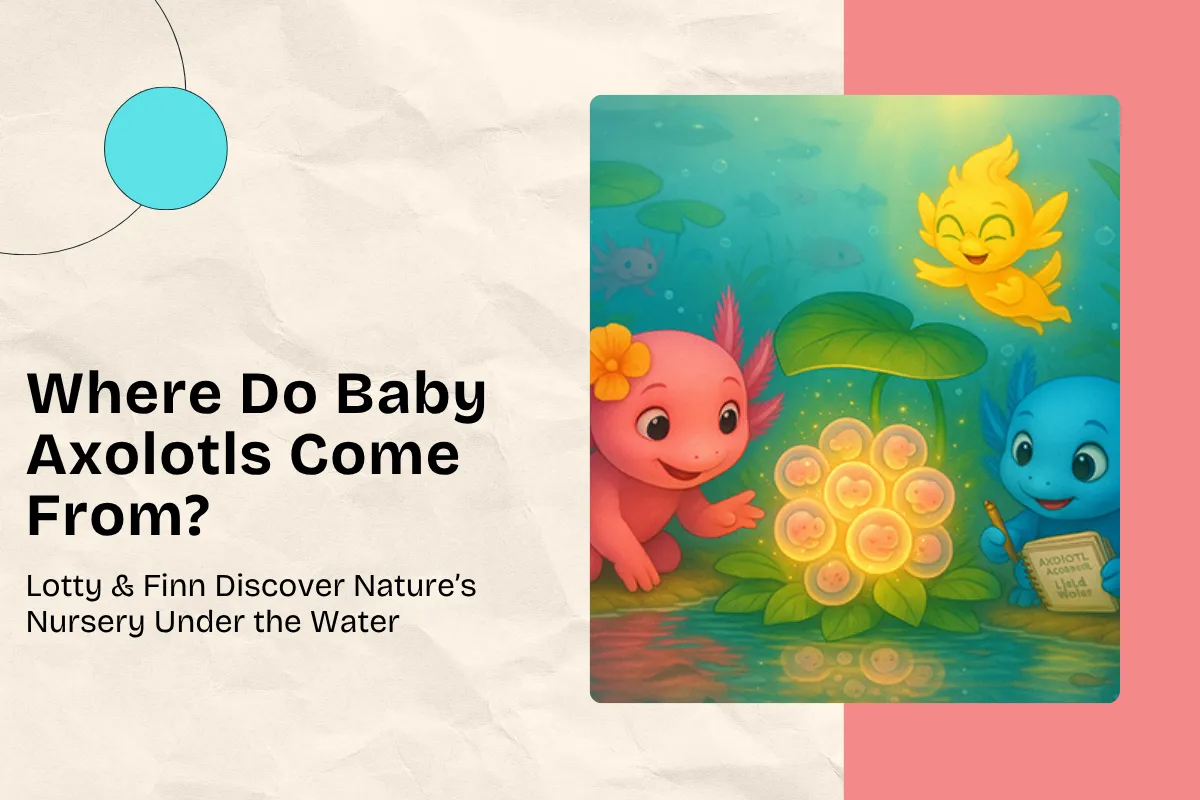
Where Do Baby Axolotls Come From?
Where Do Baby Axolotls Come From? | Lotty & Finn Discover Nature’s Nursery Under the Water
Meet Your Guides: Lotty, Finn & Glowria
Hi friends! Lotty here 🩷, with Finn and our glowing guide, Glowria.
Today we’re diving into one of the pond’s biggest mysteries: Where do baby axolotls come from?
Finn points toward a cluster of shiny bubbles stuck to a pond leaf.
“Lotty, look! Are those pearls?”
Glowria giggles, lighting up the water. “Not pearls — they’re axolotl eggs! Each one is a tiny underwater cradle for a baby waiting to hatch.”
Finn’s eyes widen. “So… when they hatch, they’ll be little axolotls?”
Lotty smiles. “Exactly — though they’re so small, we might need a new name for them.”
Finn thinks hard, then grins. “How about Axolittles?”
Glowria twinkles: “Perfect. Every big discovery starts with a little idea.”
The Magic of New Beginnings 🌱
In the real world, mama axolotls lay hundreds of eggs at a time, each one clear as glass and soft as jelly. Inside, baby axolotls — called larvae — curl up like commas, growing eyes, tails, and the tiniest pink gills.
When they hatch, these little explorers are smaller than a paperclip! They use their tails to swim, their gills to breathe, and their curiosity to explore their pond world.
Lotty: “They don’t have parents feeding them?”
Glowria: “Nope! Nature takes care of them. The pond provides food and shelter until they grow strong enough to care for themselves.”
Finn: “That’s a lotl of independence for someone so small!”
Just like us at Axolotl Academy, they start out curious, brave, and ready to learn about their world — one wiggly adventure at a time.
Axolotl Academy – Science Spotlight 🔬
For curious minds and eager learners, explore more about this topic on our Explorer Resources page.
Topic: How Baby Axolotls Are Born
In their natural home — the ancient canals of Lake Xochimilco near Mexico City — axolotls begin life in calm, plant-filled waters. Female axolotls gently attach their eggs to leaves or rocks so sunlight and oxygen can reach them.
After about two weeks, each egg hatches into a larva smaller than an inch long. These baby axolotls stay underwater their whole lives — a rare trait called neoteny, which means they never outgrow their gills or tails like frogs do.
Instead of growing up and leaving the water, axolotls keep their youthful traits forever — a reminder that staying playful and curious is a kind of superpower all its own.
Key Takeaway:
Baby axolotls are living lessons in resilience. Born in clear eggs and guided by nature, they remind us that even the smallest creatures can grow into extraordinary beings — full of wonder, color, and courage.
📘 Learn more at our Explorer Resources page and meet the five playful “Axolittles” inside our early-learning book,
A is for Axolittles: I Have an Axolotl in My School!

Lotty & Finn’s Reflections 💭
Lotty: “It’s amazing how something so tiny can hold so much life and possibility.”
Finn: “And I’m glad we gave them a name! ‘Axolittles’ makes me want to hug them all.”
Glowria: “Names have power, Finn. And so does kindness. Every time we learn about nature, we’re helping protect it.”
Why Baby Axolotls Matter
Every new batch of eggs is a fresh start for an endangered species. Scientists and conservationists in Mexico are working to protect the axolotl’s natural home — planting native reeds, cleaning waterways, and teaching others how to care for the environment.
Lotty: “So every egg is like a wish for the future.”
Glowria: “Exactly — a glowing promise that life finds a way.”
Conclusion – Small Beginnings, Big Wonder
From clear eggs to curious hatchlings, every baby axolotl reminds us that life begins with wonder — and that imagination can help keep real creatures safe.
Finn: “And now we know where baby axolotls — and Axolittles — come from!”
Lotty: “Straight from nature’s nursery… and into our hearts.”

PS: Lotty & Finn live in our imagination, where adventures are full of curiosity and fun! If you’re caring for real axolotls, always check with experts for proper guidance. Curious to dive deeper? Visit our Explorer Resources page for trusted sources and links.
